|
|
|
Sort Order |
|
|
|
Items / Page
|
|
|
|
|
|
|
| Srl | Item |
| 1 |
ID:
188180


|
|
|
|
|
| Summary/Abstract |
Diasporas do not arise from fixed connections to objective circumstances such as dispersion or relation to a homeland, but instead constantly are negotiated and re-constituted. Ranging from internal gradual change to sudden exogenous change, the re-making of a diaspora can take diverse forms. Despite the prevalence of constructivist and processual approaches, however, research on diaspora identity change has been limited. This paper takes a comparative historical perspective to the post-2016 diasporization of the Gülen Movement (GM) and discusses how the GM responded differently to sudden exogenous shocks in 1997, 2007, and 2016. In both historical institutionalism and rational choice theories, the sudden exogenous shocks do the heavy lifting to explain change; however, it is rather the endogenous parameters that account for the variation in the GM’s responses to those shocks.
|
|
|
|
|
|
|
|
|
|
|
|
|
|
|
|
| 2 |
ID:
188175
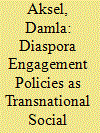

|
|
|
|
|
| Summary/Abstract |
In examining the transformations in statecraft, the existing scholarship on Turkish diaspora policies largely adopts Foucault’s governmentality perspective and suggests that the shifting policies reflect the home states’ attempt to assert control over citizens, not through coercion but rather through consent. While this framing has proved workable, it provides limited room for students of diaspora studies to incorporate the overall conceptualization on the resistance in which the non-resident citizens and countries of residence engage vis-à-vis home country politics and the potential failures of these policies. I propose to follow James Scott’s legibility framework to emphasize that the home states’ evolving policies to engage with non-resident citizens is a social engineering project, aiming to facilitate the state’s ability to monitor and mold the behavior of mobile populations in the context of neoliberal globalization. I argue that the legibility framework allows us to analyze not only the standardization processes, but also the resistance against it both from the migrants and from their countries of residence. To make my argument, I employ the framework to the case of Turkey, which has received considerable attention since the mid-2010s. This article is based on archival research of Turkish state documents on emigration, empirical research conducted between 2013 and 2014 involving nearly 100 interviewees including Turkish state officials in Turkey and with migrant representatives in France and the United States, and further examination of secondary resources, including informal talks with policy makers and diaspora representatives in the post-2016 period.
|
|
|
|
|
|
|
|
|
|
|
|
|
|
|
|
| 3 |
ID:
188181
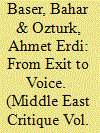

|
|
|
|
|
| Summary/Abstract |
The authoritarian turn in Turkey compelled many citizens to change life trajectories which included extreme measures such as migration and exile. Thousands of people left Turkey in the last decade, this recent wave constituting one of the largest Turkish migrations to Europe and beyond. The profile of the migrants included those who were comfortable with and/or opposed the current regime’s political and social policies, members of oppressed minority groups, Gülen movement members who are accused of orchestrating the failed 2016 coup attempt as well as white collar and secular Turkish citizens who made lifestyle migration choices because of the political and economic developments in the country. The article focuses on the narratives of a specific group within this new wave, those whom we refer to as Turkey’s intelligentsia in exile, and who decided to leave Turkey following the Gezi protests in 2013. The findings are based on 25 interviews conducted in 2021 with former academics, activists, artists, journalists and politicians who migrated to a variety of locations as a result of pending trials or arrest warrants against them, dehumanization discourse that pro-regime politicians directed toward them, as well as lack of freedom of speech and assembly.
|
|
|
|
|
|
|
|
|
|
|
|
|
|
|
|
| 4 |
ID:
188174


|
|
|
|
|
| Summary/Abstract |
Diasporas have become a topic of academic and political discussion and interest since 2000. Until recently, most diaspora research has focused on the ways the states in the Global North ‘receive’ outsiders but has devoted limited scrutiny to the role of sending states in shaping opportunity structures abroad.1 The recently growing literature on diaspora politics draw our attention to the rise of state-led diaspora engagement initiatives which aim at cultivating, (re)building, (re)shaping and (de/re)mobilizing diasporas. Currently, more than one hundred states have established forms of diaspora engagement policies and institutions, with a variety of motivations.2 Scholars try to understand the development of diaspora-engagement policies cultivated by political actors in the homeland from various disciplines including international relations, political science and sociology.
|
|
|
|
|
|
|
|
|
|
|
|
|
|
|
|
| 5 |
ID:
188178
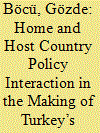

|
|
|
|
|
| Summary/Abstract |
Recent accounts in diaspora studies have advanced our understanding of various political, social and economic transnational phenomena and processes that take place between the home state and the diaspora. However, there is a growing trend in the literature that focuses on home-state diaspora relations at the expense of the core tenant of the transnationalism framework, namely the assumption that immigrant transborder politics and connections span various dynamics that involve both the home and the host country. In this article, I argue that we must revisit calls for simultaneity and turn to the interaction of policies between the home and host state when analyzing diaspora making and shaping processes. To demonstrate my argument, I analyze historical policy interactions between Turkey’s diaspora policy and Germany’s immigration and integration policy and show how interactive dynamics between the home and host country have simultaneously shaped politics in Turkey’s diasporas over time.
|
|
|
|
|
|
|
|
|
|
|
|
|
|
|
|
| 6 |
ID:
188176
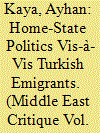

|
|
|
|
|
| Summary/Abstract |
This article scrutinizes the ways in which Turkish state actors have shaped the social ecosophy of emigrants and their descendants residing in Europe. Describing the Turkish state’s perspectives toward emigrants reveals that Turkish state actors always have instrumentalized emigrants since the beginning of the migratory processes in the 1960s. The focus will be on the current Turkish government’s acts and policies, which are likely to contribute to the Muslimization of Turkey-origin emigrants in diaspora, or in other words, to their labeling simply as ‘Muslims’. Based on a thorough analysis of secondary literature, discourse analyses of contemporary Turkish political leaders’ speeches aimed at Turkish emigrants and their descendants as well as my earlier and ongoing field research findings, I argue that it is the indifference of some European state actors who have not offered political opportunity structures for devout Muslims with Turkish background to be incorporated into the public/political space at the expense of pushing them into the Turkish state actors’ hands that offer alternative political opportunity structures. Hence, the article elaborates the ways in which receiving states’ policies and practices toward migrant-origin people impact diaspora politics of the migrant-sending states. The emphasis is on German and Turkish state actors.
|
|
|
|
|
|
|
|
|
|
|
|
|
|
|
|
| 7 |
ID:
188177
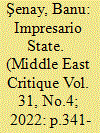

|
|
|
|
|
| Summary/Abstract |
Since the early 2000s, under successive Justice and Development Party (AKP) governments, Turkey has developed more systematic ‘engagement’ policies with its extra-territorial communities, including citizens abroad, kin and ‘relatives’, and non-Turkish international students sponsored to study in Turkey. This article examines the governmental techniques taken up by the ruling AKP elites to mobilize these constituencies as a source of what Félix Krawatzek and Lea Müller-Funk call ‘political remittance.’ To achieve this goal, the Turkish state has configured itself as an ‘impresario.’ It utilizes public pedagogy and political spectacle as key devices through which to generate desired remittances from extra-territorial communities, as well as to cast and craft its future leaders, friends, and allies.
|
|
|
|
|
|
|
|
|
|
|
|
|
|
|
|
| 8 |
ID:
188179


|
|
|
|
|
| Summary/Abstract |
While many states directly engage their non-resident populations to rally support for domestic political agendas, extract remittances, or to further foreign policy objectives, few countries have been more active in this space than Turkey under the Justice and Development Party (AKP). By the early 2020s, researchers and scholars had obtained a fairly good understanding of the ways in which the Turkish government seeks to (selectively) engage or cooperate with, but also to suppress some members of what it perceives as its diaspora. These efforts are specified in official diaspora engagement policies and implemented through, for instance, governmental institutions like the ‘Presidency for Turks Abroad and Related Communities’ (YTB), or cultural institutions like the ‘Yunus Emre Institutes.’ However, even though scholars have learned a fair bit about the supply side of Turkish diaspora engagement, we know comparatively little about the demand side of and for such efforts. To begin filling this gap, this article switches perspectives from the supplier to the consumer/recipient and seeks to understand better the ways in which diasporans perceive, relate to, and engage with such efforts. By building on primary and secondary sources as well as semi-structured interviews with members of the Turkish diaspora in Sweden, this article seeks to contribute to an understanding of the varied ways in which diasporans relate and react to different forms of state-led diaspora engagement.
|
|
|
|
|
|
|
|
|
|
|
|
|
|
|
|
|
|
|
|
|